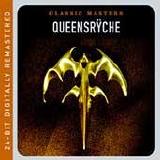"Some Hits, a Couple Misses & More True Classics" - 80%
Chronologically, this compilation appears almost half-way between 2000's Greatest Hits and 2007's Sign of the Times: The Best of Queensryche. Unlike the compilations before and after it, this one is not billed as a "greatest hits" or "best of" album. While the distinction "classic masters" does not completely remove its contents or motivation(s) for release from record label involvement and in turn the dreaded cash grab, it does theoretically make more room for a collection of genuinely classic songs rather than one of radio hits. However, despite containing what can be viewed as Queensryche classics in their own right for half of its duration, Classic Masters is not immune from the obligatory hits, and it does not entirely stave off the sorts of bad choices that inevitably pop up in this kind of assortment either.
Concerning the hits, it's likely impossible that any Queensryche compilation under the sun could ever be without "Silent Lucidity." Even so, that's hardly a bad thing since its back and forth serene to tumultuous atmosphere makes it a welcome and interesting listen after perhaps literally a million times. Another 'Ryche track that can't seem to escape "must have" compilations is "I Don't Believe in Love," which also gets a pass thanks to Eddie Jackson's pummeling bass lines and the vintage DeGarmo/Wilton trade-off and harmony.
While the aforementioned tracks suffer a bit from overexposure, but also warrant their spots through quality rather than mere popularity, two others never should have made the cut in any case. First, how did "Bridge" ever become a Queensryche song in the first place? Prior to Q2K, or perhaps Operation: Mindcrime II depending on how one may view the beginning of 'Ryche's drastic decline, "Bridge" is probably among the band's five worst tracks if not the worst. In particular, the lyrics are a bit superficial for a song that addresses how an absent father negatively affected his son's life as well as his own. This is peculiar to say the least since Queensryche had a way of writing deep--if not brilliant--lyrics quite frequently throughout the 80's as well as on "Bridge's" own Promised Land in 1994. Musically, the song sounds more like a mid-90's alternative rock ballad than a mystical, haunting, unsettling or most importantly authentic Queensryche ballad such as "Lady Wore Black," "No Sanctuary," "The Killing Words" or "Out of Mind." Then there's "Another Rainy Night," which virtually rehashes the lyrical theme of "Jet City Woman." It also wastes a fair amount of high quality riffs and an even better solo, which could have been put to much better use in a less commercial and borderline hair metal context.
As the classics go, the band's blazing namesake--"Queen of the Reich"--makes not just an obligatory, but necessary appearance. In fact, this song may be the definitive introduction for any prospective Queensryche fan since it once introduced the world to a vocalist who could seemingly do anything with his voice and two guitarists who could churn out intensity with any thrash guitarist, shred with any neoclassical guitarist and craft melodies with any power metal guitarist in 1983. Looking further into the 80's when the band established its identity and placed its stamp on metal, "Speak" was not incendiary in quite the same way "Queen of the Reich" was, but its riffs were every bit as nasty as they needed to be, Wilton's solo ripped about the same and "We'll burn the White House down" pushed lyrical boundaries just as much as any American band could have in 1988. Lastly, the previously mentioned "Killing Words" is once again a haunting and immensely powerful ballad, and it does an excellent job of showing how a metal band can pull off a vast multitude of ballads very well if it puts forth the necessary effort.
Just as it may be nearly impossible for the majority of a given band's fan base to agree upon "the ultimate set list," it may be just as futile to state in any objective fashion what a definitive collection of classics by Queensryche should possess. Nonetheless, this particular collection could have been better, and here a few examples of how that could have happened. In addition to "Queen of the Reich," "Nightrider" would have painted a fuller picture of the band's roots. Besides "Warning," "NM 156" would have highlighted more of the band's lyrical approach during its "Orwellian phase." Just like "NM 156," "Screaming in Digital," "Revolution Calling," "Damaged" and "spOOL" would have gained well-deserved recognition on such a collection, and they would have represented their respective albums as well as--or perhaps better than--some of the tracks selected for Classic Masters.
For those seeking a collection of radio hits or well-known tracks by Queensryche, the obvious way to go is Greatest Hits. For those wanting to examine the band's history and chart the evolution of early tracks that went on to define the sound and style of the debut EP and The Warning, Sign of the Times: The Best of Queensryche is perhaps the desired path: especially the second disc. However, if a prospective Queensryche fan wants to start with a compilation that features a relative minimum of radio hits as well as blunders by the band itself on one hand along with an array of genuine classics on the other, Classic Masters just might be the best place to start.

